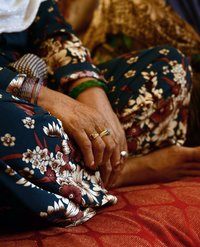Afghanistan: This is why our ongoing and long-term work for women is important

Inga, despite the many difficulties, even after 2021 we have continued to successfully support our partner organisations in Afghanistan, enabling them to empower women. Why is this continuity in the work in Afghanistan particularly important?
Continuity in the work in Afghanistan is absolutely essential for our partner organisations. The international community gave many promises not to abandon the women in Afghanistan, but actually their involvement since 2021 has mostly been no more than providing financial resources for humanitarian assistance and ensuring the provision of basic supplies. This generally leaves women and girls who have survived sexualised violence to fend for themselves.
What does this mean in practice?
The duration of projects is often too short and public funding is too limited to really ensure any long-term security for organisations led by women and the work they do. However, the work of these local women’s rights defenders is indispensable to ensure long-term advocacy for and anchoring of the rights of women. They are the people pushing for societal change, either by taking to the streets or working in secret. For this reason it is particularly important to us to provide long-term support for women-led organisations and initiatives. This co-operation with our Afghan partner organisations is something we see as acting in political and feminist solidarity. So we do more than just provide funds: we also advise and create networking opportunities.
What is the current situation in Afghanistan like?
The human rights situation in Afghanistan has continued to deteriorate since August 2021 when the Taliban took power. The United Nations Special Rapporteur on the situation of human rights in Afghanistan, Richard Bennett, also referred to this recently. As of the beginning of the 2024 new school year, female pupils are once again barred from attending classes beyond the sixth grade and are generally excluded from public life. Freedom of expression is restricted and the state continues to use violence and the threats of violence to intimidate and control the population, and women in particular. This includes extrajudicial killings, kidnappings, rapes and torture. Those at particular risk include women’s rights activists, trainee lawyers , entrepreneurs and teachers. Women and girls are threatened with sexualised and gender-based violence on a daily basis. In addition, they are often forced into extreme poverty. Many of their lives are characterised by this ongoing violence and oppression, and many of them have also been traumatised by their individual experiences of violence.
In this situation, what are the particular needs of women in Afghanistan?
To deal with this situation, women need long-term offers of support and solidarity. Trauma is a psychological or physical injury and has deep-seated social consequences. The work of our partner organisations ensures their suffering is acknowledged and comprehensive support is provided. Our partner organisations continue to perform this work in spite of the challenging conditions they face. They manage to stabilise survivors, establishing security and trust. Some of the measures that enable them to do this include comprehensive healthcare and psychosocial counselling, protection measures, and the implementation of relevant vocational programmes.
In times like these, how important is the work of women’s rights organisations?
Immensely important. It is deeply moving to see how much the teams at our partner organisations manage to achieve each day. New impulses are always being given, thanks to their courage, creativity, hope and tenacity. They are determined to continue. Another crucial element is trust. Trust in their own power and ability to have an impact, as well as the trust in our joint feminist values and goals. Together we are standing up for women’s rights and for a better future for women and girls in Afghanistan.
Does this continuity in the work also imply a long-term approach?
Our work and the work of our partner organisations in Afghanistan involves supporting and strengthening women’s rights activists and their resistance, carrying forward the struggle to uphold women’s rights and prevent violence against women – faced with very difficult conditions. Sustainability and long-term impacts can be ensured by securing financial support for the work of women’s rights organisations, creating spaces where women can meet and experience safety and sharing, offering digital support for women affected by violence, and making it possible for future lawyers to train despite study bans. It takes time to strengthen this important work, especially the support structures within Afghanistan, so this work needs continuity. Afghan women’s rights activists and women-led organisations are trying out new paths and adapting their approaches in order to be able to continue their work whilst ensuring it remains impact-oriented. We need to encourage them in their efforts and provide them with ongoing support.
In these difficult circumstances in Afghanistan, what developments do you see that indicate the impacts these projects are having?
At a time when women are experiencing increasing violence against them in Afghanistan, their rights are being drastically restricted, and they are receiving almost no legal support as a result of the Taliban’s prohibition on certain professions and studying, it is impressive to see how our partner organisations succeed time and again in giving women and girls courage and hope. They are opening up career prospects, enabling them to support yet more women now and in the future, including the provision of legal assistance. The impacts of our feminist work also become very tangible when I hear how vulnerable women’s rights activists and their families have managed to survive and escape to a safe country where they can set up charities and support networks for the women back in Afghanistan.



